Minister for Agriculture Michael Creed is in the UK this week as part of the traditional global charm offensive carried out by ministers ahead of St Patrick’s Day. While the minister may have taken the shortest flight, in the context of Irish agriculture, he is embarking on one of the most important visits carried out by any of his colleagues this week.
The political discussions with his counterpart Michael Gove will be important in a Brexit context. British as well as Irish farmers will be concerned about the apparent willingness of the UK government to leave the confines of the EU customs union and, as outlined by UK prime minister Theresa May, retain the right to set its own tariffs on imports.
In an Irish context, such a move could seriously undermine the value of the British market to us post-Brexit with Irish beef being forced to compete with Brazilian imports. With Brazilian beef prices currently running at the equivalent of €2.10/kg, such a move would seriously destabilise both the British and Irish markets. The meeting with his British counterpart provides Minister Creed with an ideal opportunity to reinforce the risks for both British and Irish farmers – and indeed British consumers – of removing or reducing tariffs on beef imports from South America.
No doubt at both political and retail levels, the minister will be assured that the strong trading relationship in agri food that exists between Britain and Ireland will protect Ireland’s place in the market post-Brexit.

Top of the priority list for Minister Creed this week should be removing artificial barriers that have effectively shut down the live trade between Ireland and the UK. \ Ramona FarrellyIt is a hollow commitment that will carry little weight when new sourcing opportunities present themselves for British retailers. Even the threat of sourcing product from Brazil will be enough to depress the British and Irish market – as was evident back in 2005.
Artificial barriers
Instead of accepting such hollow reassurances, we would expect that Minster Creed would press for retailers to further strengthen their relationship with Ireland. Top of the priority list should be removing artificial barriers that have effectively shut down the live trade between Ireland and the UK. Historically, tens of thousands of cattle made their way from marts in the west of Ireland for finishing or direct slaughter in Northern Ireland, and indeed directly to English farms for finishing.
Despite the large burger chains and top three British supermarkets promoting their entire beef offering as British and Irish, they won’t accept product from animals born in Ireland and finished in Britain.
While EU labelling regulations are being put forward as the reason, it is difficult to accept why this is such an issue for retailers in the UK.
In mainland Europe, cattle regularly transit from one country to another, and indeed 400,000 NI lambs make their way south every year for processing in Irish factories and onward sale in EU markets.
As we highlight here, these barriers have reduced what was once a vibrant live trade to just a trickle of animals crossing the border. In 2013, over 32,000 finished cattle went north for direct slaughter. Last year, this had fallen to just over 11,000 cattle. So far in 2018, just 528 cattle have gone north.
The decline of recent years coincides with Dawn Meats and the ABP Food Group significantly growing their presence in the UK. It is disappointing therefore that these mixed-origin cattle are unable to find a place in the prime UK market.
The financial implications for the farmers that traditionally relied on this trade cannot be ignored by Minister Creed.
From his visit this week, the minister must satisfy himself that labelling regulations are not being used by British retailers and their processing partners that have a footprint in both the UK and Ireland as an artificial trade barrier.
Unless he is in a position to do so, then he has a duty to Irish farmers to pursue the issue through the appropriate channels.
Dairy: Glanbia farmers dealt body blow
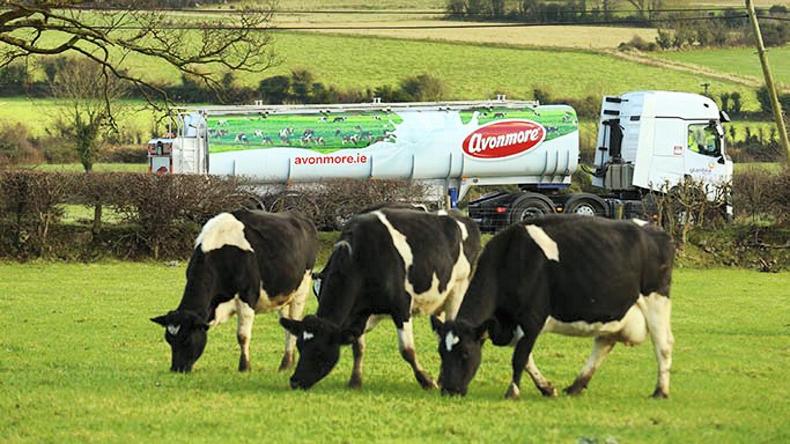
Glanbia shocked the market by announcing a record 3c/l price cut at the start of the week.Glanbia shocked the market by announcing a record 3c/l price cut at the start of the week.
Last week, Glanbia was rightly praised for its swift response in helping farmers deal with the effects of Storm Emma. Unfortunately, this goodwill was quickly eroded when the processor shocked the market by announcing a 3c/l base price cut at the start of the week – albeit introducing a 1c/l top-up fund. It has been over a decade since Glanbia’s milk price fell so sharply in the space of a few weeks. In the absence of an obvious market shock, questions are rightly being asked as to why such a correction was required to a price set just five weeks previously. The rights and wrongs of such a sharp price cut can be argued in the context of market returns, but the judgement of a co-op-controlled processor to heap further pressure on its suppliers at such a challenging time has to be questioned.
Naturally, many of the calls we received this week have questioned just how in touch the board members who took this decision are with what is happening on the ground. Before the added pressure of a severe price cut, farmers were already struggling to cope with the aftermath of Storm Emma, dreadful ground conditions, lack of grass, tight fodder supplies and the ongoing challenges of a busy calving period.
Hopefully the boards of other co-ops will take the current situation into consideration when meeting over the next few days. Longer term, we should question whether the current monthly pricing model is fit for purpose or whether other models would give farmers a greater degree of certainty and transparency.
Tillage: Coverage from all around the country
As the calendar moves us closer to spring, the Irish Farmers Journal is delighted to report that we will bring extended weekly coverage to our tillage readers. Each week we will carry three reports direct from growers in different regions of the country.
This From The Tramlines feature will aim to reflect the challenges faced by growers in different regions on a weekly basis and provide an indication of the variable growing and weather conditions that exist around the country.
Weather has provided one of the biggest challenges to the sector in recent years, but it provides both challenges and opportunities and we hope that the coverage presented from these growers can help others.
We thank the 12 growers profiled this week for their participation in this project and hope that all tillage farmers will benefit from their farm updates.
Save Our Sucklers: Thousands turn up give their support
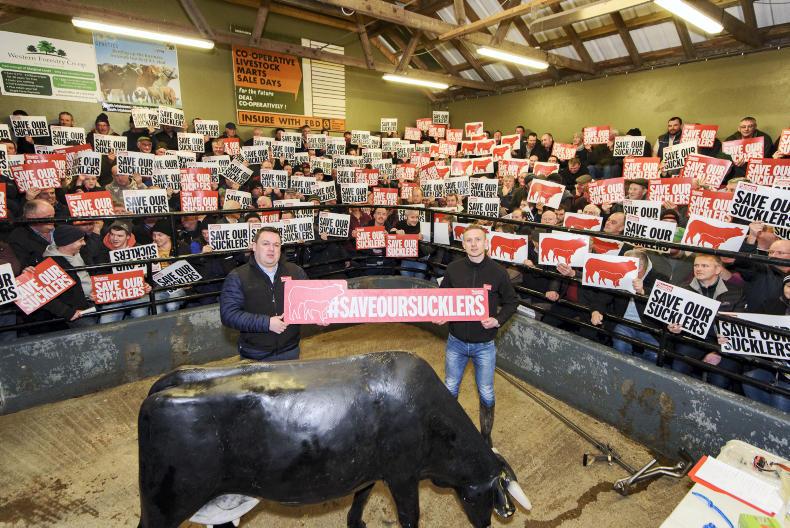
Adam Woods and Ciarán Lenehan at the Irish Farmers Journal/IFA Save Our Sucklers event in Inishowen Co-Op Mart in Carndonagh, Co Donegal. \ Clive WassonAdam Woods and Ciarán Lenehan at the Irish Farmers Journal/IFA Save Our Sucklers event in Inishowen Co-Op Mart in Carndonagh, Co Donegal. \ Clive Wasson
The Save Our Sucklers mart campaign wraps up this week and thanks to the thousands who turned out at venues from Carndonagh to Castleisland and signed the petition.
As Phelim O’Neill reports on page 25, coupled payments are a feature in 23 of the 28 members of the EU. Across these countries, there are 50 different schemes, with different payment structures ranging from payments on cows, calves and fattening cattle. There are also geographical variants, as in Scotland – and it is notable that they are second to only to Sweden (who also have a coupled payment) in the EU for prices paid to farmers for beef. Anyone yet to sign the petition can do so here.
Sheep: Higher returns needed to cover costs

This pen of seven hoggets weighing 42kg on average sold for €107 each (€2.55/kg) at Ballymote Mart last week. This pen of seven hoggets weighing 42kg on average sold for €107 each (€2.55/kg) at Ballymote Mart last week. Read the report here.
It is welcome to see sheep prices continuing to rise and opening quotes for spring lambs at a higher level than last year.
The production system has been under pressure in recent years and this year’s lambing is no different with difficult weather driving up prices.
Primary producers need a price capable of delivering a viable margin and the system is still vulnerable, even at the higher prices.
Beef finishers are also in a difficult position with factories curtailing recent price optimism.
Steer and heifer prices are falling well short of the €4.40/kg to €4.50/kg finishers need to break even with the future of winter finishing in an even more precarious position.
Read more
Collapse in cattle exports to the North
From the Tramlines
Minister for Agriculture Michael Creed is in the UK this week as part of the traditional global charm offensive carried out by ministers ahead of St Patrick’s Day. While the minister may have taken the shortest flight, in the context of Irish agriculture, he is embarking on one of the most important visits carried out by any of his colleagues this week.
The political discussions with his counterpart Michael Gove will be important in a Brexit context. British as well as Irish farmers will be concerned about the apparent willingness of the UK government to leave the confines of the EU customs union and, as outlined by UK prime minister Theresa May, retain the right to set its own tariffs on imports.
In an Irish context, such a move could seriously undermine the value of the British market to us post-Brexit with Irish beef being forced to compete with Brazilian imports. With Brazilian beef prices currently running at the equivalent of €2.10/kg, such a move would seriously destabilise both the British and Irish markets. The meeting with his British counterpart provides Minister Creed with an ideal opportunity to reinforce the risks for both British and Irish farmers – and indeed British consumers – of removing or reducing tariffs on beef imports from South America.
No doubt at both political and retail levels, the minister will be assured that the strong trading relationship in agri food that exists between Britain and Ireland will protect Ireland’s place in the market post-Brexit.

Top of the priority list for Minister Creed this week should be removing artificial barriers that have effectively shut down the live trade between Ireland and the UK. \ Ramona FarrellyIt is a hollow commitment that will carry little weight when new sourcing opportunities present themselves for British retailers. Even the threat of sourcing product from Brazil will be enough to depress the British and Irish market – as was evident back in 2005.
Artificial barriers
Instead of accepting such hollow reassurances, we would expect that Minster Creed would press for retailers to further strengthen their relationship with Ireland. Top of the priority list should be removing artificial barriers that have effectively shut down the live trade between Ireland and the UK. Historically, tens of thousands of cattle made their way from marts in the west of Ireland for finishing or direct slaughter in Northern Ireland, and indeed directly to English farms for finishing.
Despite the large burger chains and top three British supermarkets promoting their entire beef offering as British and Irish, they won’t accept product from animals born in Ireland and finished in Britain.
While EU labelling regulations are being put forward as the reason, it is difficult to accept why this is such an issue for retailers in the UK.
In mainland Europe, cattle regularly transit from one country to another, and indeed 400,000 NI lambs make their way south every year for processing in Irish factories and onward sale in EU markets.
As we highlight here, these barriers have reduced what was once a vibrant live trade to just a trickle of animals crossing the border. In 2013, over 32,000 finished cattle went north for direct slaughter. Last year, this had fallen to just over 11,000 cattle. So far in 2018, just 528 cattle have gone north.
The decline of recent years coincides with Dawn Meats and the ABP Food Group significantly growing their presence in the UK. It is disappointing therefore that these mixed-origin cattle are unable to find a place in the prime UK market.
The financial implications for the farmers that traditionally relied on this trade cannot be ignored by Minister Creed.
From his visit this week, the minister must satisfy himself that labelling regulations are not being used by British retailers and their processing partners that have a footprint in both the UK and Ireland as an artificial trade barrier.
Unless he is in a position to do so, then he has a duty to Irish farmers to pursue the issue through the appropriate channels.
Dairy: Glanbia farmers dealt body blow

Glanbia shocked the market by announcing a record 3c/l price cut at the start of the week.Glanbia shocked the market by announcing a record 3c/l price cut at the start of the week.
Last week, Glanbia was rightly praised for its swift response in helping farmers deal with the effects of Storm Emma. Unfortunately, this goodwill was quickly eroded when the processor shocked the market by announcing a 3c/l base price cut at the start of the week – albeit introducing a 1c/l top-up fund. It has been over a decade since Glanbia’s milk price fell so sharply in the space of a few weeks. In the absence of an obvious market shock, questions are rightly being asked as to why such a correction was required to a price set just five weeks previously. The rights and wrongs of such a sharp price cut can be argued in the context of market returns, but the judgement of a co-op-controlled processor to heap further pressure on its suppliers at such a challenging time has to be questioned.
Naturally, many of the calls we received this week have questioned just how in touch the board members who took this decision are with what is happening on the ground. Before the added pressure of a severe price cut, farmers were already struggling to cope with the aftermath of Storm Emma, dreadful ground conditions, lack of grass, tight fodder supplies and the ongoing challenges of a busy calving period.
Hopefully the boards of other co-ops will take the current situation into consideration when meeting over the next few days. Longer term, we should question whether the current monthly pricing model is fit for purpose or whether other models would give farmers a greater degree of certainty and transparency.
Tillage: Coverage from all around the country
As the calendar moves us closer to spring, the Irish Farmers Journal is delighted to report that we will bring extended weekly coverage to our tillage readers. Each week we will carry three reports direct from growers in different regions of the country.
This From The Tramlines feature will aim to reflect the challenges faced by growers in different regions on a weekly basis and provide an indication of the variable growing and weather conditions that exist around the country.
Weather has provided one of the biggest challenges to the sector in recent years, but it provides both challenges and opportunities and we hope that the coverage presented from these growers can help others.
We thank the 12 growers profiled this week for their participation in this project and hope that all tillage farmers will benefit from their farm updates.
Save Our Sucklers: Thousands turn up give their support

Adam Woods and Ciarán Lenehan at the Irish Farmers Journal/IFA Save Our Sucklers event in Inishowen Co-Op Mart in Carndonagh, Co Donegal. \ Clive WassonAdam Woods and Ciarán Lenehan at the Irish Farmers Journal/IFA Save Our Sucklers event in Inishowen Co-Op Mart in Carndonagh, Co Donegal. \ Clive Wasson
The Save Our Sucklers mart campaign wraps up this week and thanks to the thousands who turned out at venues from Carndonagh to Castleisland and signed the petition.
As Phelim O’Neill reports on page 25, coupled payments are a feature in 23 of the 28 members of the EU. Across these countries, there are 50 different schemes, with different payment structures ranging from payments on cows, calves and fattening cattle. There are also geographical variants, as in Scotland – and it is notable that they are second to only to Sweden (who also have a coupled payment) in the EU for prices paid to farmers for beef. Anyone yet to sign the petition can do so here.
Sheep: Higher returns needed to cover costs

This pen of seven hoggets weighing 42kg on average sold for €107 each (€2.55/kg) at Ballymote Mart last week. This pen of seven hoggets weighing 42kg on average sold for €107 each (€2.55/kg) at Ballymote Mart last week. Read the report here.
It is welcome to see sheep prices continuing to rise and opening quotes for spring lambs at a higher level than last year.
The production system has been under pressure in recent years and this year’s lambing is no different with difficult weather driving up prices.
Primary producers need a price capable of delivering a viable margin and the system is still vulnerable, even at the higher prices.
Beef finishers are also in a difficult position with factories curtailing recent price optimism.
Steer and heifer prices are falling well short of the €4.40/kg to €4.50/kg finishers need to break even with the future of winter finishing in an even more precarious position.
Read more
Collapse in cattle exports to the North
From the Tramlines












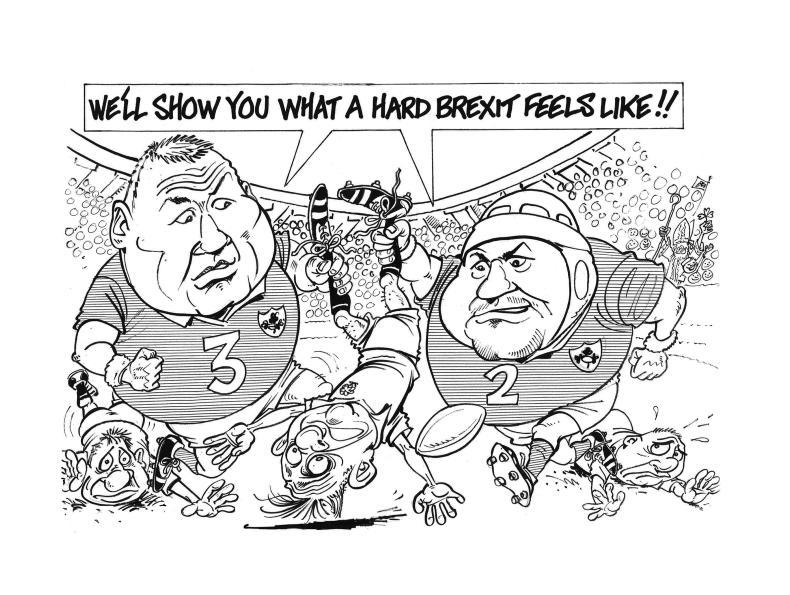


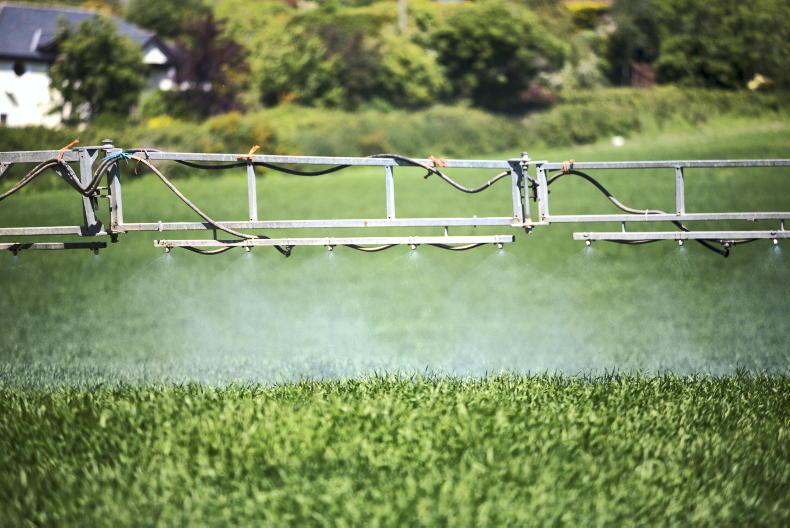
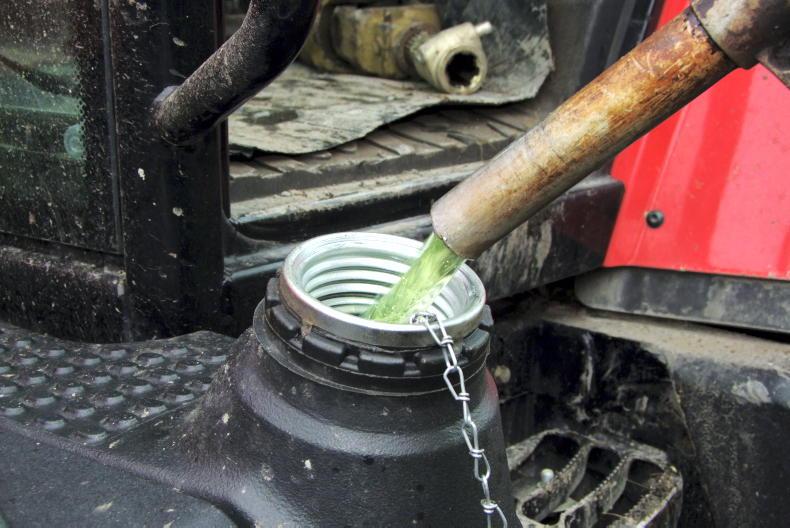
SHARING OPTIONS